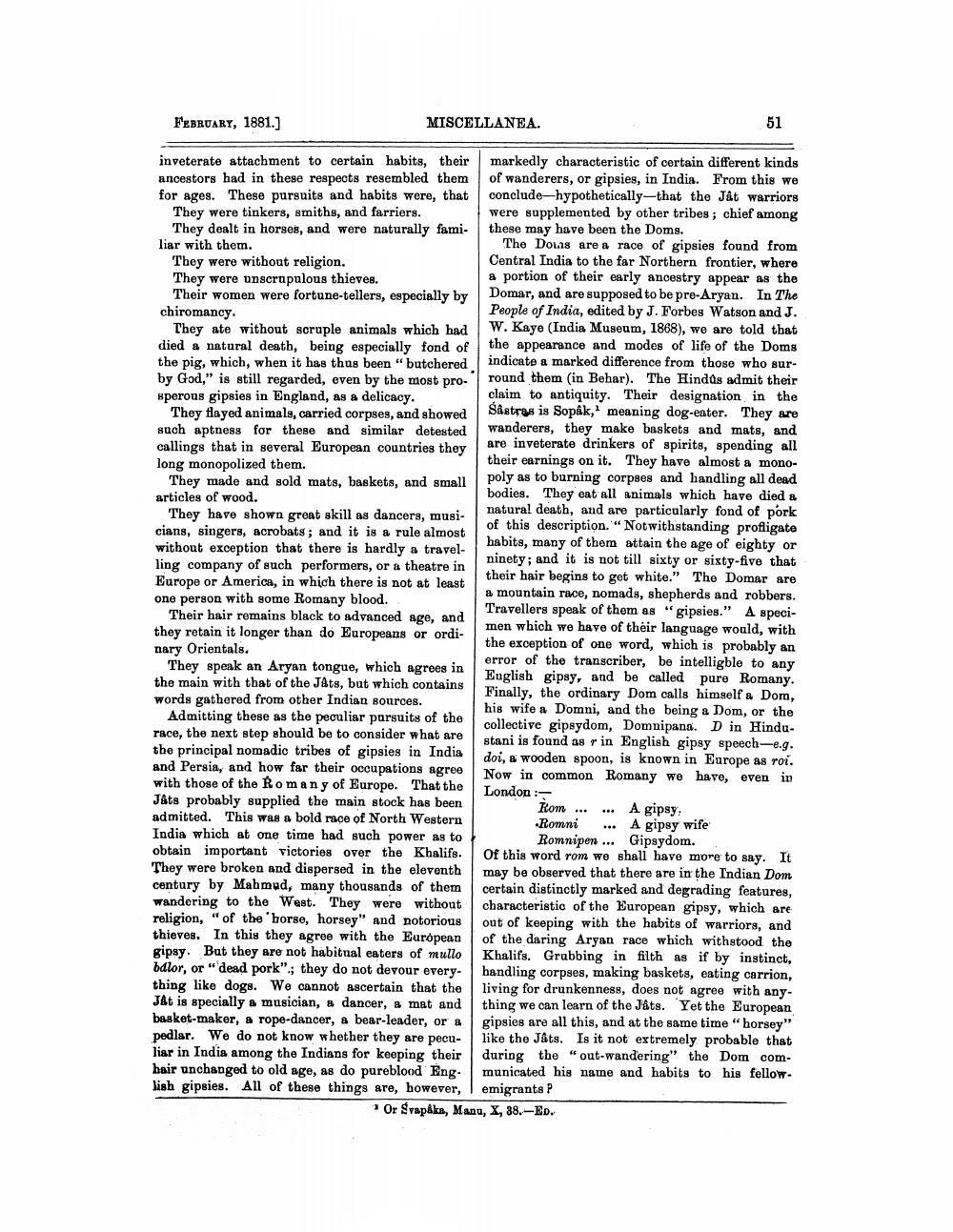________________
FEBRUARY, 1881.]
MISCELLANEA.
inveterate attachment to certain habits, their markedly characteristic of certain different kinds ancestors had in these respects resembled them of wanderers, or gipsies, in India. From this we for ages. These pursuits and habits were, that conclude-hypothetically-that the Jât warriors
They were tinkers, smiths, and farriers. were supplemented by other tribes; chief among
They dealt in horses, and were naturally fami- these may have been the Doms. liar with them.
The Dous are a race of gipsies found from They were without religion.
Central India to the far Northern frontier, where They were unscrupulous thieves.
a portion of their early ancestry appear as the Their women were fortune-tellers, especially by Domar, and are supposed to be pre-Aryan. In The chiromancy.
People of India, edited by J. Forbes Watson and J. They ate without scruple animals which had W. Kayo (India Museum, 1868), we are told that died & natural death, being especially fond of the appearance and modes of life of the Doms the pig, which, when it has thus been" butchered indicate a marked difference from those who sur. by God," is still regarded, even by the most pro- round them (in Behar). The Hindus admit their sperous gipsies in England, as a delicacy.
claim to antiquity. Their designation in the They flayed animals, carried corpses, and showed
Såstras is Sopak, meaning dog-eater. They are such aptness for these and similar detested
wanderers, they make baskets and mats, and callings that in several European countries they
are inveterate drinkers of spirits, spending all long monopolized them.
their earnings on it. They have almost a monoThey made and sold mats, baskets, and small
poly as to burning corpses and handling all dead articles of wood.
bodies. They eat all animals which have died a They have shown great skill as dancers, musi
natural death, and are particularly fond of pork cians, singers, acrobats; and it is a rule almost
of this description." Notwithstanding profligate without exception that there is hardly a travel
habits, many of them attain the age of eighty or ling company of such performers, or a theatre in
ninety; and it is not till sixty or sixty-five that Europe or America, in which there is not at least
their hair begins to get white." The Domar are one person with some Romany blood.
a mountain race, nomads, shepherds and robbers. Their hair remains black to advanced age, and
Travellers speak of them as "gipsies." A speci
men which we have of their language would, with they retain it longer than do Europeans or ordi
the exception of one word, which is probably an nary Orientals. They speak an Aryan tongue, which agrees in
error of the transcriber, be intelligble to any
English gipsy, and be called pure Romany. the main with that of the Jats, but which contains
Finally, the ordinary Dom calls himself a Dom, words gathered from other Indian sources.
his wife a Domni, and the being a Dom, or the Admitting these as the peculiar pursuits of the
collective gipsydom, Domnipana. Din Hindurace, the next step should be to consider what are
stani is found as r in English gipsy speech-e.g. the principal nomadic tribes of gipsies in India
doi, a wooden spoon, is known in Europe as roi. and Persia, and how far their occupations agree
Now in common Romany we have, even in with those of the Romany of Europe. That the
London :Játs probably supplied the main stock has been
Rom ... ... A gipsy admitted. This was a bold race of North Western
Romni ... A gipsy wife India which at one time had such power as to
Romnipen ... Gipsydom. obtain important victories over the Khalifs. Of this word rom we shall have more to say. It They were broken and dispersed in the eleventh may be observed that there are in the Indian Dom century by Mahmud, many thousands of them certain distinctly marked and degrading features, wandering to the West. They were without characteristic of the European gipsy, which are religion, "of the horse, horsey" and notorious out of keeping with the habits of warriors, and thieves. In this they agree with the European of the daring Aryan race which withstood the gipsy. But they are not habitual eaters of mullo Khalifs. Grabbing in filth as if by instinct, balor, or "dead pork".; they do not devour every- handling corpses, making baskets, eating carrion, thing like dogs. We cannot ascertain that the living for drunkenness, does not agree with any. Jat is specially a musician, a dancer, a mat and thing we can learn of the Jåts. Yet the European basket-maker, a rope-dancer, a bear-leader, or a gipsies are all this, and at the same time "horsey" pedlar. We do not know whether they are pecu- like the Jåts. Is it not extremely probable that liar in India among the Indians for keeping their during the "out-wandering" the Dom comhair unchanged to old age, as do pureblood Eng. municated his name and habits to his fellow lish gipsies. All of these things are, however, I emigrants P
0r Svapéka, Manu, X, 38.-ED.




